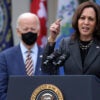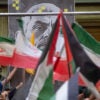The United States joined many Western nations in expelling Syrian diplomats yesterday in a coordinated reprimand of the Syrian government, which has stepped up its bloody repression of its own people. Britain, Canada, France, Italy, Germany, the Netherlands, Spain, Switzerland, and Australia also joined a growing list of countries that have expelled Syrian diplomats. The expulsions came after the U.N. Security Council on Sunday condemned the massacre of at least 108 Syrians, including 49 children and 34 women in Houla, a bastion of support for the Syrian opposition.
Former U.N. Secretary-General Kofi Annan met with Syrian dictator Bashar al-Assad yesterday and expressed “grave concern” about the escalating violence. Annan desperately is seeking to salvage his own increasingly irrelevant “peace plan” that Assad ostensibly agreed to six weeks ago, but still has failed to implement.
The Annan plan’s illusory cease-fire unfortunately gave the Assad regime cover to continue its campaign of intimidation. Burhan Ghalioun, president of the Syrian National Council opposition movement, complained that Annan’s efforts have made the situation worse: “Annan cannot continue his mission after the massacres that have taken place, visiting Damascus without batting an eyelash.”
Annan’s flawed peace plan also gave cover to the passive Obama Administration, because it implied that something was being done at the U.N. to address Syria’s deepening problems. But Russia has exercised its veto power to prevent any effective action at the Security Council against Syria, one of its few remaining allies in the Middle East. It has long been apparent that the Annan plan is a zombie—dead but not buried.
The expulsion of Syrian diplomats is embarrassing for an Administration that came into office naively seeking to engage unconditionally with the Assad regime. The Obama Administration broke with the Bush Administration’s policy of seeking to isolate and pressure the Assad regime. It sought to reverse the Bush Administration’s 2005 decision to withdraw the U.S. Ambassador to Syria because of Syrian interference in Lebanon and support of Iraqi insurgents. When the Senate refused to approve the reinstatement of an ambassador, the White House dispatched an ambassador in a recess appointment.
The Obama Administration’s diplomatic courtship of the Assad regime was rewarded with attacks on the U.S. embassy and threats against the U.S. ambassador that eventually led to his recall. As with Iran, the naïve engagement of Syria’s dictatorship has failed to advance U.S. national interests, while undermining Syrians’ struggle for freedom.
Soon, even Annan will recognize that his U.N. mission in Syria has failed because of the ruthless actions of the Assad regime, which can survive only through the application of violence and intimidation. Russia is likely to preserve its client in Damascus by deflecting international pressure to take effective action at the U.N. Security Council.
The U.N. is a flawed choice for enforcing the peace absent a solid international consensus, as it proved in failing to halt the massacre at Srebrenica in Bosnia in 1995. If any effective action is to be taken, it must be taken by the United States and its NATO allies, particularly Turkey, which shares a long border with Syria.
The Obama Administration must develop more robust contingency plans with NATO and other allies for protecting Syrian refugees, delivering humanitarian aid, reducing the regime’s military threat to its own people, and seizing the regime’s chemical weapons if the regime implodes. But Washington should not provide arms to the Syrian opposition until it knows exactly who it is dealing with and has ironclad guarantees that those arms will not fall into the hands of terrorists.
Turkey should play a major role in any NATO contingency planning for Syria and should provide most of the ground troops if any are deemed necessary. The United States could provide logistical and air support for humanitarian operations, including a corridor for moving humanitarian aid inside Syria, if it is militarily feasible, has sufficient support from NATO and regional allies, and Washington has enough confidence in the opposition groups who would benefit from it.
The United States should not commit ground troops inside Syria. Syrian opposition leaders have not urged such an intervention anyway. Nor is it practical to dispatch peacekeeping troops to a country where there is no peace to keep. Moreover, American troops inevitably would become a lightning rod for terrorist attacks by al-Qaeda, which has opened up a new front inside Syria, or by Iran’s Revolutionary Guards and Hezbollah, which launched suicide bomb attacks against U.S. peacekeeping troops in Lebanon in the 1980s and have dispatched forces to aid the Assad regime.
The United States should not become entangled in a half-baked U.N. peacekeeping operation whose effectiveness is hamstrung by Russian and Chinese maneuvering at the Security Council. But it also cannot allow the Assad regime to literally get away with murder. It should work with NATO and other allies to escalate sanctions against the Assad regime, oust it from power, and help protect Syrian refugees until the regime has fallen.


























